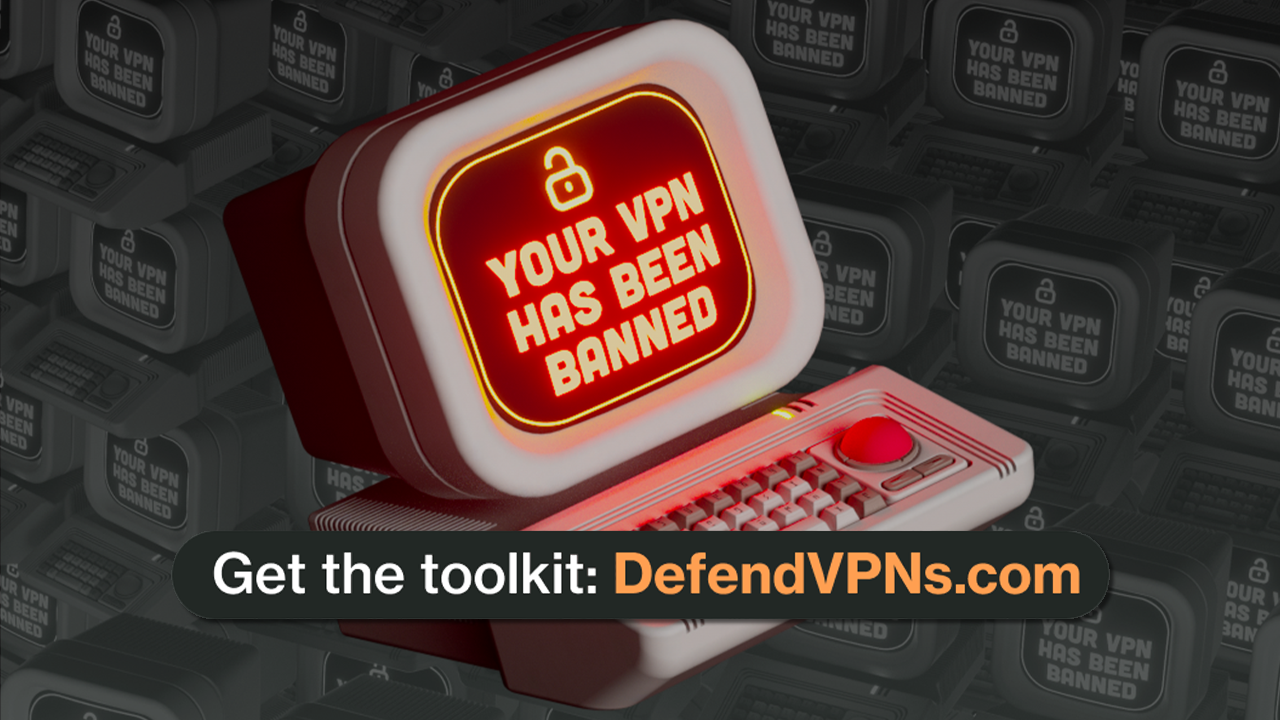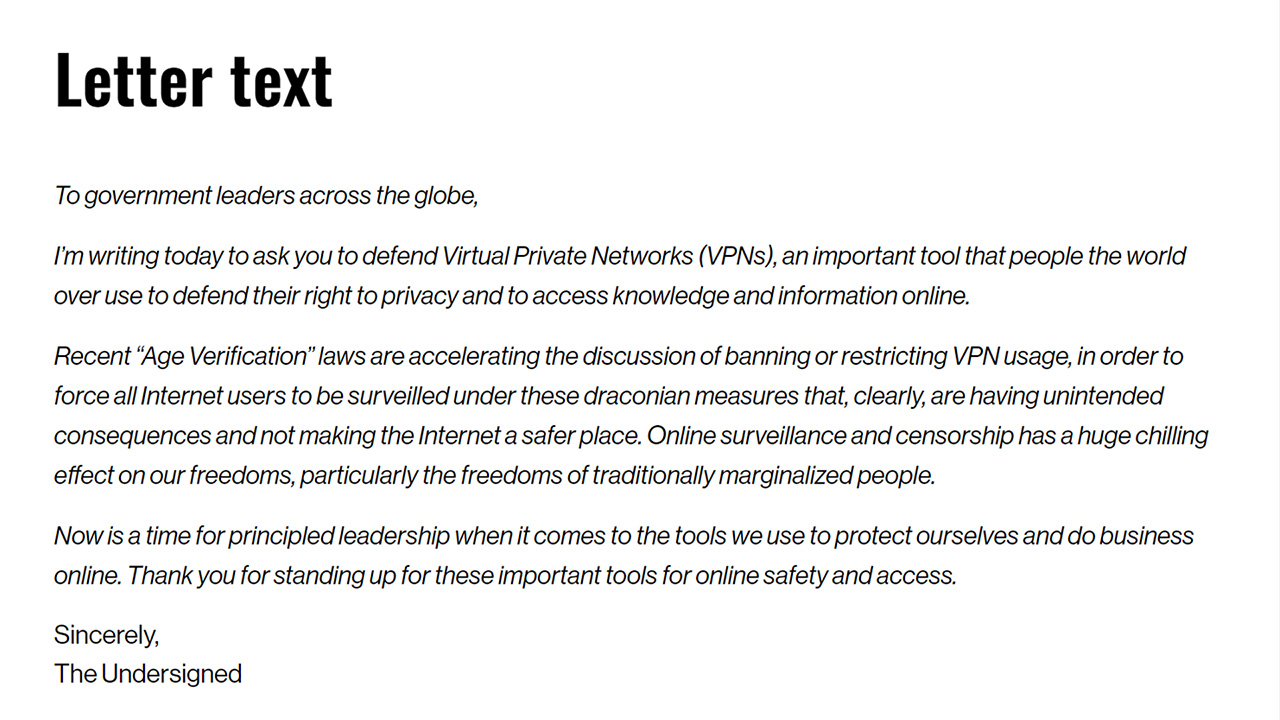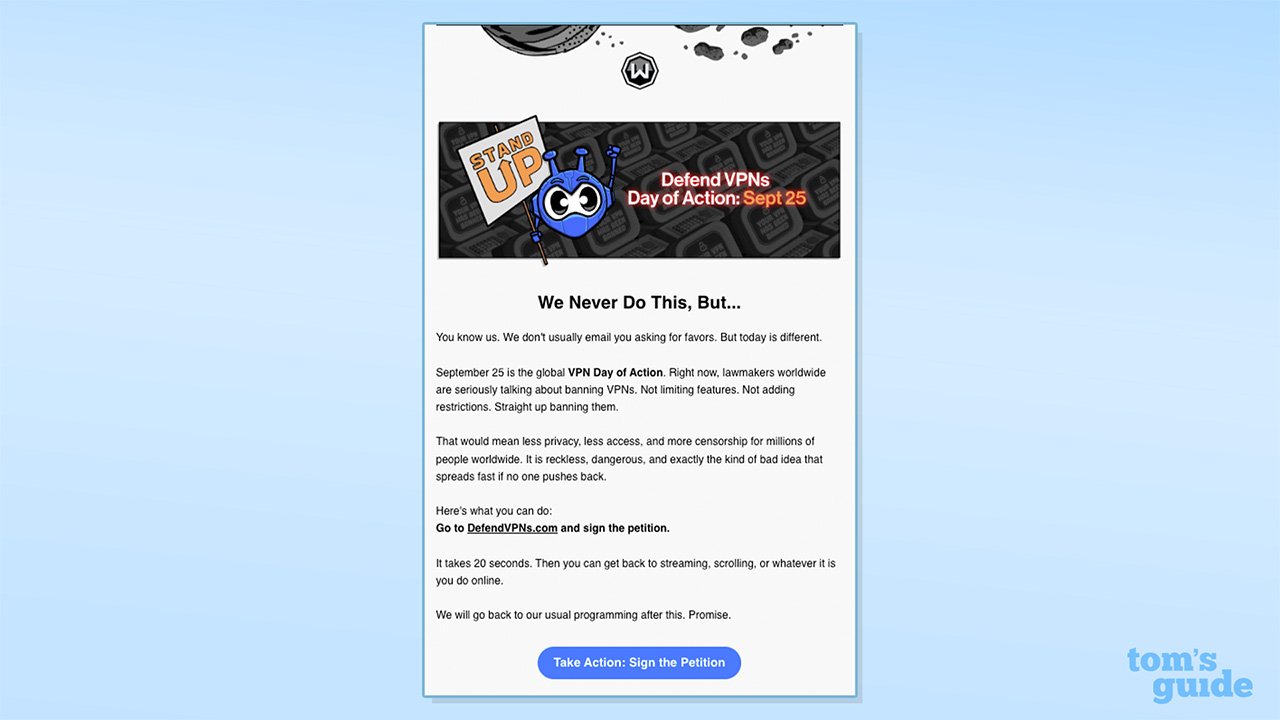VPN Day of Action: Providers and activists call on politicians to "leave VPNs alone"
Amid a surge in attacks on VPNs and internet freedoms, some are fighting back

September 25, 2025, is being marked as a global VPN Day of Action. The goal is to spotlight how lawmakers are targeting the best VPNs and considering "outright bans" on the privacy tools.
The effort is being led by Fight for the Future – a group of artists, engineers, activists, and technologists – with leading VPN providers are also taking part.
Fight for the Future is encouraging people to sign an open letter and contact their political representatives.
Windscribe is one of the providers that is "actively participating." It's sending out emails to its users, as well as in-app notifications. The VPN Trust Initiative (VTI), which includes NordVPN, Surfshark, and ExpressVPN, and the VPN Guild, which includes Amnezia VPN, are also confirmed to be participating.
You can sign the letter by visiting DefendVPNs.com.
Governments are trying to ban VPNs. They want your internet censored and controlled. Today, during the global VPN Day of Action, you can fight back. Sign this petition to make it known you're not willing to give up your privacy. It takes 20 secs, do it. https://t.co/vnEtsptgHo pic.twitter.com/5OR3lwvTcWSeptember 25, 2025
Why is a Day of Action needed?
Fight for the Future says it wants "a future where technology is a force for liberation – not oppression" and it criticises the attacks on VPNs and internet freedoms.
VPN usage spiked in the UK following the introduction of the Online Safety Act – something Fight for the Future described as "draconian." VPNs appeared to be successful in bypassing age verification checks, as people didn't feel comfortable in having to submit sensitive personal information to access certain websites. This led to questions around a UK VPN ban.
25 US states, including Arizona, have passed similar age verification laws. Michigan is going one step further, with lawmakers proposing a bill that would amount to a total VPN ban. If passed, promoting VPN usage could result in fines of up to $500,000.
VPNs are already banned in numerous countries around the world, and heavily restricted in others.
Lia Holland, Campaigns and Communications Director at Fight for the Future, said: "VPNs are a crucial online privacy and safety tool that allow people living under authoritarian regimes and with 19th-century privacy laws to circumvent censorship and surveillance."
Holland continued by saying "reputable VPNs have become essential tools that support everyday people in exercising their basic human rights" and "politicians are getting very close to kicking the hornet's nest of millions of people who know how important VPNs are."
Discussing today's VPN Day of Action, Holland said the noise they will hear will "be their last warning to leave VPNs alone."
Fight for the Future is calling on people to sign an open letter to world leaders. Don't ban VPNs is their message, and they say using the internet safely and privately is a human right.

For those living in the US, the group is also encouraging people to call their lawmakers.
Providing a phone number and ZIP code appears to enable the Fight for the Future team to get in touch with you. The team will "provide you with a suggestion of what to say and connect you directly with your lawmaker's office."
The group says your number will not be shared with third parties and has a dedicated privacy policy.
A pop-up asking if you can call your lawmaker also appears once you have signed the letter.
VPN providers join the fight
Leading VPN providers and groups are also taking part in the day of action. Windscribe is one of them, and it called potential VPN bans "devastating."
Windscribe said VPN bans "take away one of the few tools people have to protect themselves online."
"Without VPNs, you are stuck with whatever your government or ISP wants you to see, and every click is easier to trace back to you," the provider added. "That’s not security, that’s surveillance."
It said how VPNs are essential for free expression and an important tool for reaching "information and communities that would otherwise be blocked."
Windscribe concluded by saying that "banning VPNs does not make the internet safer. It just makes it smaller, more controlled, and a whole lot scarier for the people who need it most."
A dedicated email is being sent out to Windscribe users. The provider said it rarely asks its users to support something other than its VPN, highlighting "how seriously" it is taking this campaign.

The email calls on Windscribe users to sign Fight for the Future's letter. Windscribe said although it may not feel like much, signing is "an accessible first step."
The provider said "the more people who add their name, the harder it is for lawmakers to ignore the issue" and thousands of people talking about VPN bans would create "momentum."
Windscribe added that the end goal is to force politicians into treating VPN bans "as a real problem instead of something they can quietly slip through."
We test and review VPN services in the context of legal recreational uses. For example: 1. Accessing a service from another country (subject to the terms and conditions of that service). 2. Protecting your online security and strengthening your online privacy when abroad. We do not support or condone the illegal or malicious use of VPN services. Consuming pirated content that is paid-for is neither endorsed nor approved by Future Publishing.

George is a Staff Writer at Tom's Guide, covering VPN, privacy, and cybersecurity news. He is especially interested in digital rights and censorship, and its interplay with politics. Outside of work, George is passionate about music, Star Wars, and Karate.
You must confirm your public display name before commenting
Please logout and then login again, you will then be prompted to enter your display name.
